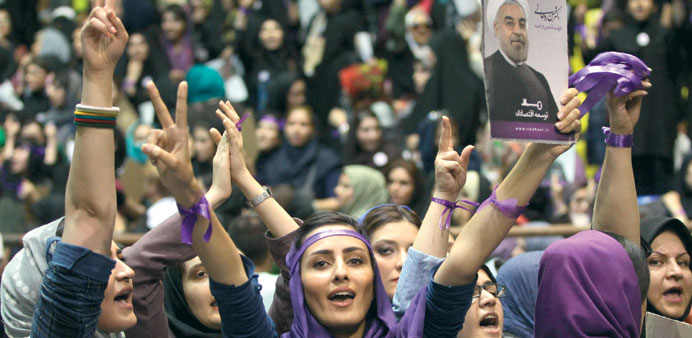Agencies/Tehran
Iranian presidential candidate Hassan Rowhani yesterday said he would release all political prisoners if he won June’s election.
“If I win, I will start the process of political reconciliation among all political groups, enable the release of all politically related prisoners and prepare grounds for social tranquillity,” Rowhani said at a campaign rally in Tehran.
The 64-year-old cleric is one of two candidates for the June 14 election considered to be reformists.
Rowhani said Iran’s international isolation was due not only to the dispute with the West over its nuclear programme but also to the political repression in the country.
“I will bring the country out of this isolation, with rationality and wisdom,” he said.
The campaign rally was held at Shahid Shiroudi stadium in central Tehran. Although it took place in the afternoon on a working day, it was attended by thousands of people.
The crowd held banners and chanted slogans demanding the release of all political prisoners in Iran, especially those who were detained after the last presidential election.
At several earlier campaign appearances, Rowhani called for greater freedom of speech and criticised President Mahmoud Ahmadinejad’s government for having banned opposition parties.
“Expressing an opinion is not a crime, and one cannot jail people just because they have another opinion,” he said.
“In a country where the grounds for free thinking are not provided in the universities, the term science has no meaning,” he added.
Iran’s media yesterday hailed the latest televised debate of the presidential candidates, highlighting sharp exchanges among them on topics such as the nuclear issue and political freedom.
“The differences among the candidates are clear. The final sprint has begun,” said leading economic daily Donya-e Eqtesad about the debate on Friday evening.
Reformist daily Arman hailed the discussions, saying they “showcased differences”.
The eight men vying for the presidency clashed in the heated exchange over nuclear talks with world powers, with pointed criticism aimed at top nuclear negotiator and hardline candidate Saeed Jalili, a frontrunner in the election.
“I would have liked to have written that the winner of last night’s debate was Hassan Rowhani or (reformist) Mohamed Reza Aref, but I have to say (conservative) Ali Akbar Velayati was the real winner,” wrote political analyst Sadegh Zibakalam in reformist daily, Etemad.
“On the one hand, he defended the foreign policy of (ex-president Akbar) Hashemi Rafsanjani and, on the other, he openly criticised the attitude of Jalili in nuclear negotiations.”
“Nobody can accuse Velayati of being uninformed, or linked to the West... or as not part of the conservative camp”.
Velayati, an adviser to Supreme Leader Ayatollah Ali Khamenei, had lashed out at Jalili for his handling of nuclear negotiations with world powers.
“The art of diplomacy is that we save the nuclear right, while at the same time, we reduce the sanctions,” Velayati said.
Iran has been slapped with several rounds of sanctions targeting its ailing economy, leading to raging inflation and high unemployment.
The reformist daily Bahar said “reformers (Rowhani and Aref) showed their unity, while the conservatives showed their differences” during the debate.
Aref criticised what he said was political pressure on his supporters.
“Is it normal to prevent my supporters from showing portraits of Mohamed Khatami?” he asked during the debate, referring to the reformist ex-president accused of backing opposition leaders Mir Hossein Mousavi and Mehdi Karoubi in the 2009 presidential election.
Mousavi and Karoubi had denounced as fraudulent the result of that election, and tens of thousands of their supporters took to the streets opposing Ahmadinejad’s return to office for a second term.
The two have been under house arrest for more than two years.
Most of the candidates have reportedly asked for a fourth and final debate before the election, in what is seen as a sign of success of Friday’s televised exchanges.

Female supporters hold posters of Rowhani during the rally in Tehran yesterday.
